Results
-
 £154.60
£154.60Den store dagen - Benny Borg
This beautiful song contains a huge contrast between the hopeful and the disappointing. A mother has her birthday and is waiting her children to celebrate it. Each verse starts optimistically, but the short chorus is characterized by the disappointment, that everyone calls, and cannot come. This has been tried recreated musically, mostly in the last two choruses, as it dawns on her that she will not receive a visit. It's a beautiful tune, but with a serious message that it's easy to take someone for granted.One of the elements the musicians came up with after rehearsal, was that they really liked the change between the ballad parts with even eights and the swing parts. This also gives the piece a sense of "parlando" character, which tells a story, and is therefore important to focus. It is not quite simple, as the melody also in those parts with even eights has some triplet rhythms. Therefore, this is a topic you can work on.Regarding instrumentation, Flugelhorn, Alto Saxophone and Euphonium have important roles, in addition to the rest of the first parts in the Band. The arrangement is written so you are not depending on "special" instruments. Important details are also often duplicated so you can use the arrangement for a smaller Wind Band.It is also possible to use a vocal soloist, but then you must soften the instruments that holds the melody.
Estimated dispatch 7-14 working days
-
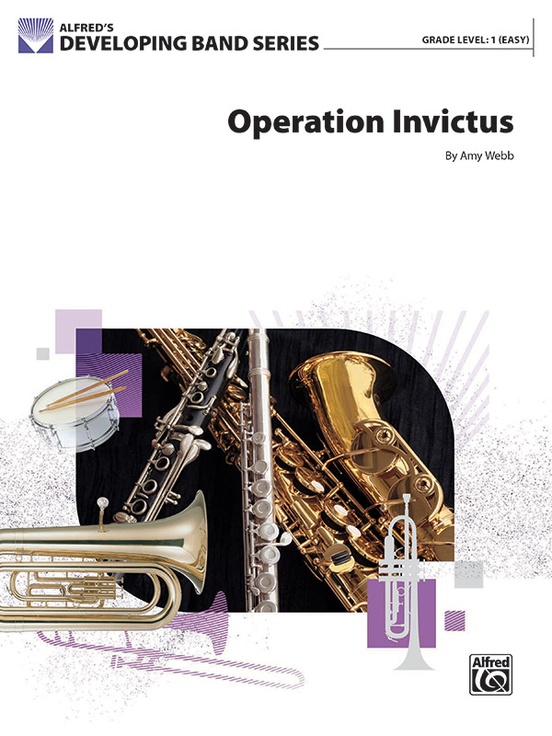 £53.95
£53.95Operation Invictus (Concert Band - Score and Parts) - Webb, Amy
Operation Invictus is a rising band work that checks all the boxes: exciting parts for all players, commanding rhythms, and challenging, yet surmountable melodies that will leave your band feeling great about themselves and their performance. Each instrument gets to play snappy little licks that are so engaging they'll want to practice. Even the low brass gets some fanfare-like material that will sound powerful. The very word invictus is Latin for "undefeated." A tremendous piece at the easy level that can be played either at the beginning or end of your next concert or festival. Duration: 3.00
Estimated dispatch 7-14 working days
-
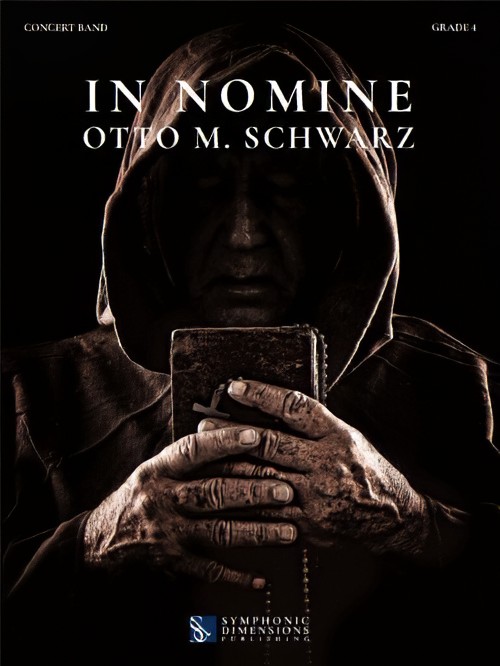 £159.99
£159.99In Nomine (Concert Band - Score and Parts) - Schwarz, Otto M.
How often has something been justified by, declared to be, or blessed as 'in the name of' some cause or other? How can it be that opposing armies and the use of weapons are ever 'in the name of...'? This is a common thread in the history of different faiths. Good was created but evil was committed and all 'in the name of...' This thread is also found in the history of the Premonstratensian Abbey at Wadgassen. The abbey was built in the 12th century on unfertile, desolate moorland, which later evolved into the most powerful religious community in the Saarland. The history of the abbey records quite astounding achievements under the motto desertum florebit quasi lilium ('the desert will bloom like a lily'); but also the harsh treatment of delinquents. The order had its own school, in which children were taught the seven liberal arts (which included music as well as geography and astronomy), but the poor were left to starve outside the abbey walls and were only allowed to eat from the members' leftovers on feast days. The medieval witch trials demanded their pound of flesh, and one group that fell victim were ecstatic dancers who moved wildly to music, which was interpreted as the devil's work. The result: a show trial that sentenced the dancers to death by fire. All in the name of... The year is 1789: Abbot Bordier is in the tenth year of his command. He does not yet know that he is to be the last abbot of an almost 700-year tradition. Not far from the abbey is the French border, which has long been making itself felt with the sound of gunfire, and the brothers continue to keep a nervous eye on it. The first portents of the French Revolution loom, but no one wants to believe it, that is, until the French pound the door down, storm the abbey and come right into the brothers' chambers. In a blind fury, all the pipes of the abbey organ are torn out, icons beheaded with swords and brothers beaten death while numerous buildings are set on fire. The abbey church is in flames. A frantic and desperate escape begins. Abbot Bordier and a handful of brothers make their getaway via the River Saar, adjacent to the abbey, to the neighbouring village of Bous. They survive, but their life, the Premonstratensian abbey, is destroyed. While they flee towards Prague and the sanctuary of the Strahov Monastery, the abbey at Wadgassen is razed to the ground and becomes a stone quarry. The desert blooms once more, however. A few short decades later, a glasswork arises from the foundations of the abbey. As peace returns to the region, it brings jobs and a new vision for its people.Duration: 11.15
Estimated dispatch 7-14 working days
-
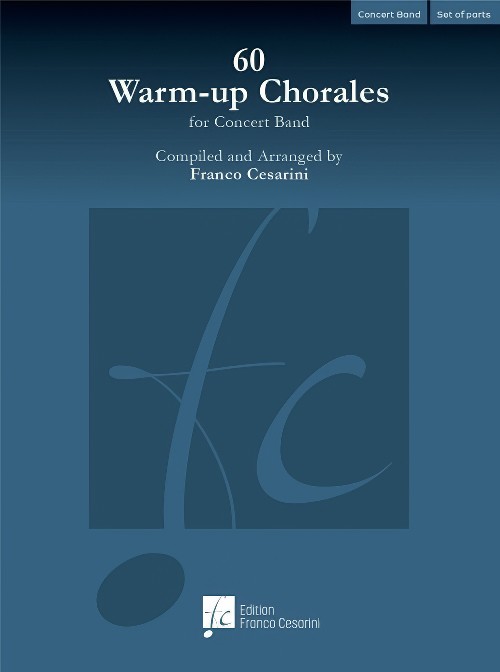 £175.00
£175.0060 Warm-Up Chorales (Concert Band - Score and Parts) - Cesarini, Franco
During his experience as a band conductor and teacher of wind orchestra conducting at university, Franco Cesarini has dealt with the topic of warm-ups very frequently. Throughout these long years of conducting he has had the opportunity to try many existing methods, evaluating their advantages and disadvantages. After a long time, he has decided to compile a collection of chorales for warm-ups, which are organised according to the criteria that he considers most effective. While working on his60 Warm-up Chorales for Concert Band, Franco Cesarini has always borne in mind that amateur musicians play for pleasure. He feels that it is extremely important that they have satisfaction at every moment of the rehearsal and not to start the rehearsal with needless "punishing" exercises. Nobody is really motivated to start playing with scales, long notes, or tricky rhythmical exercises. There is often a distinguished absentee in band rehearsals, namely music itself! Although this publication does not foresee a specific tempo for the chorales, they should often be performed rather slowly but without dragging. Dynamics are not indicated, so that the conductor has the opportunity to draw the attention of the musicians to his gestures and to make them react according to his indications. Timpani and bell parts have been added with the aim of not leaving the percussionists completely inactive during the warm-up phase, but can also be omitted. The chorales are written in four parts (SATB) and are also playable in smaller groups. The four voices can be played in different combinations of woodwinds or brass quartets or in mixed combinations. The collection includes ten chorales for the following keys: D flat major, A flat major, E flat major, B flat major, F major and C major. With his 60 Warm-up Chorales Franco Cesarini would like to convey the message to play the chorales in a musical way, thus raising the musicians' awareness of phrasing, the right interpretation of cadences, rubato and agogic. Above all, never do anything without putting the musical aspect in the foreground. 60 Warm-up Chorales for Concert Band: A perfect collection to warm-up and improve tuning of a concert band!
Estimated dispatch 7-14 working days
-
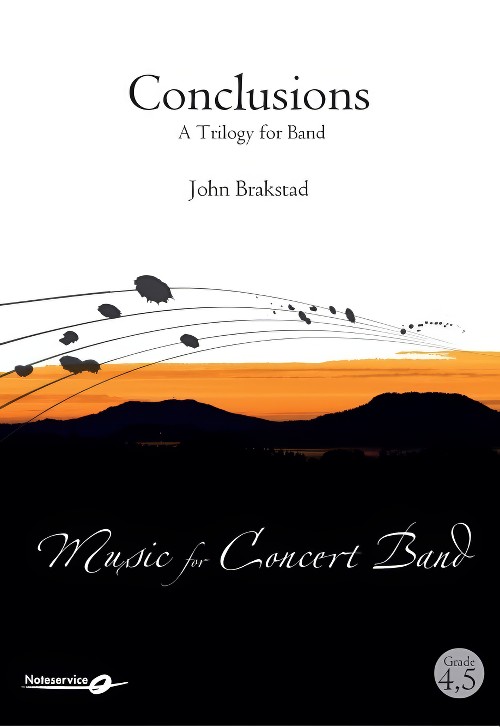 £140.00
£140.00Conclusions, A Trilogy for Band (Concert Band - Score and Parts) - Brakstad, John
Conclusions is inspired by three of the worlds greatest astronomers; their lifes, work and pioneering conclusions. 1: Copernicus. Nicolaus Copernicus lived in the 15th century. He introduced the idea that the planets rotate around the Sun rather than the Earth. This was a new and controversial world view which was not accepted in his lifetime. 2: Galileo. Galileo Galilei lived about a hundred years later and is sometimes called "the father of modern science". He is credited with the discovery of Jupiter's four largest moons. His discoveries supported Copernicus' model of the Solar System, and also showed that objects rotate around other planets than the Earth. Galilei was charged with heresy, and had to recant his claim that the Earth revolved around the Sun. "And yet it does move", he is supposed to have said. 3: Newton. Isaac Newton is known for his theory about the law of gravity and how it affects motion. This theory enabled him to accurately calculate the paths of the planets in the Solar System, and was a third conclusion in the astronomical tradition. In the same way that the three astronomers' independent conclusions build on ideas that are common to all three, Conclusions is built up of three independent movements which all include references to each other (melodic, harmonic, inversions etc.) Duration: 11.00
Estimated dispatch 7-14 working days
-
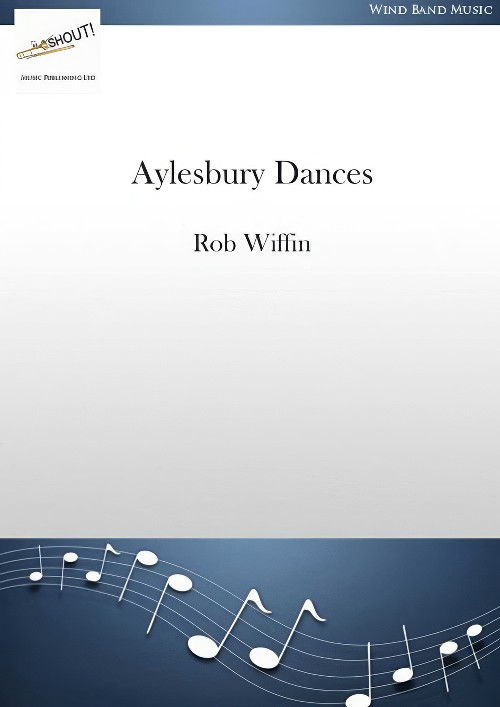 £69.95
£69.95Aylesbury Dances (Concert Band - Score and Parts) - Wiffin, Rob
The suite Aylesbury Dances was commissioned by the Aylesbury Concert Band to mark the occasion of their 25th Anniversary in 2019. Its three movements depict different aspects of Aylesbury: I. Pavane: The Town - Having read something of the town's history and its architecture I decided I wanted to write something ceremonial with the feel of music from Tudor times. Aylesbury was given its charter and borough status in 1554 by Mary Tudor so I took that as my starting point but then added some harmony that moves forward in time. This fits with the town's motto: Semper Prorsum (Always forward) and also with the Band's evolution from Aylesbury Town Band to Aylesbury Community Concert Band to Aylesbury Concert Band. The music can be defined as a pavane, or a cortege. The sense of procession is slightly disturbed by a 'Blue Leanie' moment. The Blue Leanie is an iconic Aylesbury building, an oblique rhombic prism which stands at an angle of 17% inclination. I took a quaver out of the time signature (I know the maths don't work!) to reflect this and added some bluer harmony at that point. This opening movement gives a sense of the grandeur and heritage of Aylesbury town and a chance for my friends from the brass section to warm up! II. Siciliana: Waterside - To balance the outer two movements, the middle movement of the suite has a slow lilting 6/8 rhythm. It is in the style of a Siciliana, a dance form originating in the baroque era. It is a graceful, tender and melancholic dance, cast here in a minor key and featuring the dark voice of the cor anglais. The Siciliana was often linked with pastoral scenes and Aylesbury itself sits amid some beautiful countryside. It may, therefore, seem a bit of a stretch to call this movement 'Waterside', especially as Aylesbury is so far from the sea, but the town has a theatre of that name and that was the genesis for this particular music. There is a statue of Ronnie Barker in the grounds of the Waterside theatre as he started his career in repertory theatre in Aylesbury, so I included a fleeting reference to the theme music of the comedy programme 'Open all Hours'. III. Frolic: Ducks in a Row - It was impossible to write a piece connected with Aylesbury without considering the famous Aylesbury ducks. Duck rearing was a major industry in the town in the 19th century. The white Aylesbury Duck is a symbol of the town, appearing on its coat of arms and in the logo of the Aylesbury Concert Band! This movement is all about trying to get the little darlings in a row so they can sing their 'Duck Chorus' together but they keep on scattering, flying off or swimming away as quickly as they can manage. It's a bit like watching ducks disperse when my dog jumps into the stream after them. Eventually we get more of them in a row - even though they protest. Hidden amongst the ducks is a reference to Erica Miller, saxophonist and chairman of the band, and there's even a veiled reference to a shark in the hope of getting them out of the water. Ducks in a Row is a fun romp bringing this suite of Aylesbury Dances to a suitably celebratory conclusion.- Rob Wiffin.Duration: 9.15
Estimated dispatch 7-14 working days
-
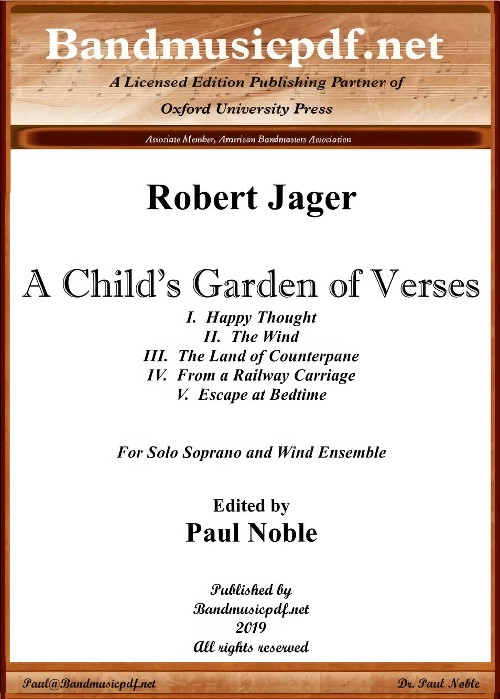 £150.00
£150.00A Child's Garden of Verses (Soprano Solo with Concert Band - Score and Parts) - Jager, Robert - Noble, Paul
A Child's Garden of Verses has a very special meaning for me. Bob Jager, a family friend, was visiting in our home, and my wife, Mitzi Noble, a soprano soloist, was singing to his children. Bob's two young children became so enthralled with the music that Bob wanted to capture that moment. So he composed this piece for Mitzi, and dedicated it to his children, Kathleen and Matthew. The text is from Robert Louis Stevenson's poems: I. Happy Thought; II. The Wind; III. The Land of Counterpane; IV. From a Railway Carriage; V. Escape at Bedtime. Bob writes: The ideal performance instrumentation would be one on a part. If a larger group is used the balance should be kept proportional. In a few places the terms Solo or One are used where the sonority is critical, and this should be strictly followed. Above all, the singer should never feel forced by the ensemble. This work was composed in 1972, and was never published. I am pleased that Bob has allowed me now to publish it under Noble Music Publications, so that it may be available for others to perform and enjoy. Mitzi writes: Although we did not have access at the time, the ideal performance would be with a throat mic so that the soloist is free to move around the stage and sing, as though singing and relating to children sitting on the front row.
Estimated dispatch 7-14 working days
-
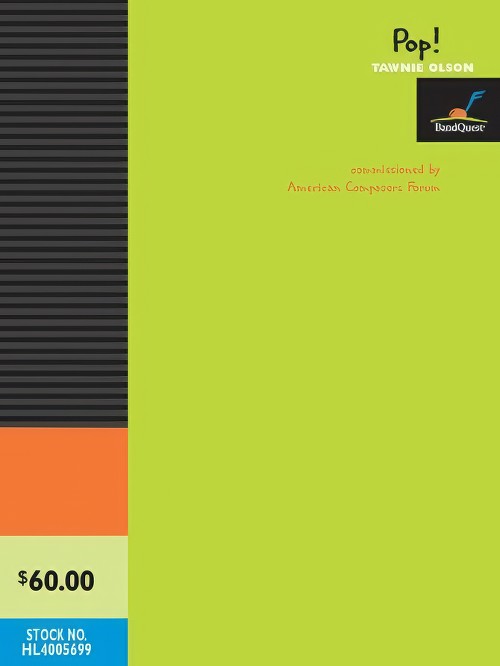 £57.50
£57.50Pop! (Concert Band - Score and Parts) - Olson, Tawnie
Inspired by the ever-popular snack, Pop! is a grade 3 band piece by composer Tawnie Olson that imitates the sounds popping popcorn beginning with that first, single kernel to the exploding sounds of an overflowing pot. Through the use of imitation, additive processes, playful articulation, and the development of tune fragments, Olson crafted a piece that is relatable and great fun to play. Pop! also has an aleatoric passage that gives young performers the opportunity to co-compose by improvising sounds that suggest of pop of popcorn in the making.
Estimated dispatch 7-14 working days
-
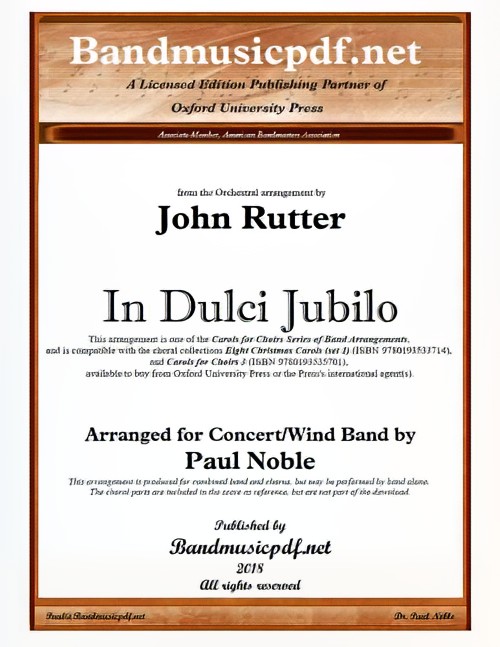 £75.00
£75.00In Dulci Jubilo (Concert Band with Optional Choir - Score and Parts) - Noble & Rutter
One night in 1328, the German mystic and Dominican monk Henrich Suso (or Seuse) had a vision in which he joined angels dancing as the angels sang to him Nun singet und seid froh or In Dulci Jubilo. In Suso's biography (or perhaps autobiography), it was written: Now this same angel came up to the Servant [Suso] brightly, and said that God had sent him down to him, to bring him heavenly joys amid his sufferings; adding that he must cast off all his sorrows from his mind and bear them company, and that he must also dance with them in heavenly fashion. Then they drew the Servant by the hand into the dance, and the youth began a joyous song about the infant Jesus, which runs thus: 'In dulci jubilo', etc. In Dulci Jubilo is among the oldest and most famous of the macaronic songs, one which combines Latin and a vernacular language such as English or German. Five hundred years later, this carol became the inspiration for the 1853 English paraphrase by John Mason Neale, Good Christian Men, Rejoice. Perhaps the earliest English version appeared c.1540. That popularity has endured for nearly 700 years. It's the rare contemporary collection of Christmas carols that doesn't contain a carol based on this ancient jewel.
Estimated dispatch 7-14 working days
-
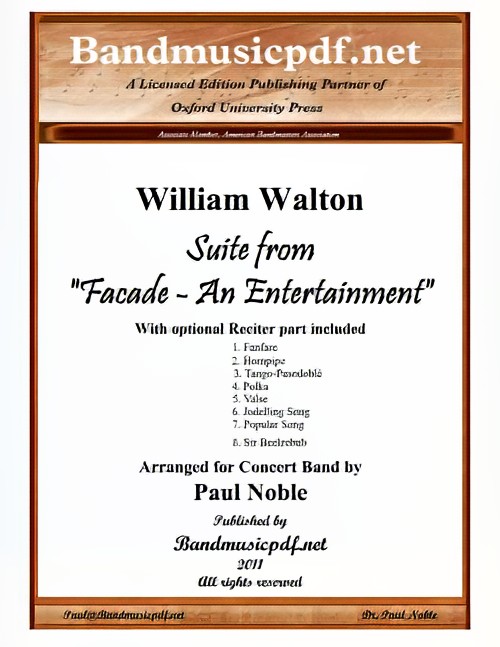 £375.00
£375.00Facade - An Entertainment, Suite from (Concert Band with Optional Narrator - Score and Parts) - Walton, William - Noble, Paul
This Suite from Facade - An Entertainment, composed by William Walton, with poems by Dame Edith Sitwell, presents for the first time a grouping of movements selected and arranged by Paul Noble for Concert Band and optional Reciter. The original composition was written between 1921 and 1928, containing forty-three numbers. They had their origin in a new style of poetry that Edith Sitwell evolved in the early 1920s, poems that her brother Osbert later described as 'experiments in obtaining through the medium of words the rhythm and dance measures such as waltzes, polkas, foxtrots... Some of the resulting poems were sad and serious... Others were mocking and gay... All possessed a quite extraordinary and haunting fascination.' Possibly influenced by the dance references in some of the numbers, Osbert declared that the poems might be further enhanced if spoken to a musical accompaniment. The obvious choice of composer was the young man who lived and worked in an attic room of the Sitwell brothers' house in Carlyle Square W[illiam] T[urner] Walton, as he then styled himself. The now historic first performance of the Facade Entertainment took place in an L-shaped first-floor drawing-room on January 24, 1922. Accompaniments to sixteen poems and two short musical numbers were performed by an ensemble of five players. The performers were obscured from the audience by a decorated front curtain, through which a megaphone protruded for Edith to declaim her poems. This was, as she put it, 'to deprive the work of any personal quality'. The first public performance of Facade was given at the Aeolian Hall on June 12, 1923. By now, fourteen poems had been set, others revised or rejected, and an alto saxophone added to the ensemble. The occasion gave rise to widespread publicity, both pro and contra, and the name of the twenty-one year old W. T. Walton was truly launched. In the ensuing years the Facade has gone through revisions and additions, with full orchestral arrangements of selected movements being made without the Reciter. Former Band Director Robert O'Brien arranged some movements for band, again without Reciter, which are now out of print. So this 'history making' addition is the first opportunity for Concert Bands to present some movements of Facade with poems as originally intended. The luxury of electronic amplification allows the full ensemble to perform without necessarily overshadowing the Reciter. And the arrangements are written with considerable doubling so that the ensemble may play in full, or reduced in size as may be desired for proper balance. And, though not encouraged, the arrangements are written so that the band can perform the music without the Reciter. Program notes are adapted in part from those written by David Lloyd-Jones and published by Oxford University Press in the Study Score of William Walton's Facade Entertainments.
Estimated dispatch 7-14 working days
